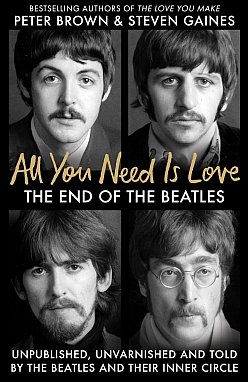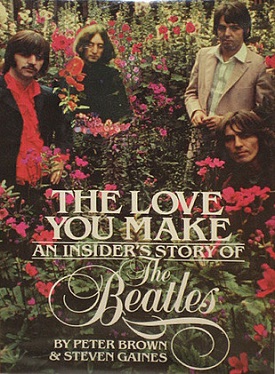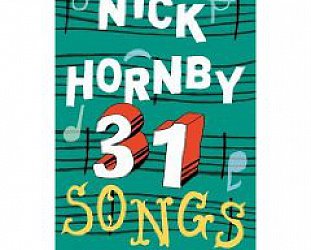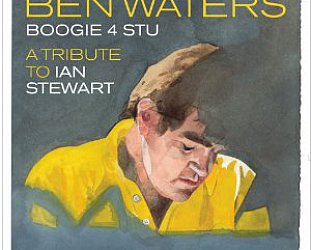Graham Reid | | 2 min read

When Albert Goldman published his scurrilous, scum-sifting biography The Lives of John Lennon in 1988, the late Beatle's friends and acquaintances circled the wagons and vehemently denounced the book which, among other things, described Yoko Ono as a controlling junkie witch and suggested Lennon might have had a hand in what killed his friend Stuart Sutcliffe who died in Hamburg.
Goldman in a subsequent interview was dismissive and said that of course his critics would come to the defence of their man. After all, meeting John Lennon, even if only briefly, was one of the best things – maybe the only good thing – that had happened in their lives.
There may have been a measure of truth in that, although it hardly explained or excused his awful book.
When Peter Brown and Steven Gaines published their The Love You Make: An Insider's Story of the Beatles in 1983 they met with a not dissimilar reception for how seamy it was.
Brown was dismissed as the insider who got lucky (he was a Brian Epstein confidant in Liverpool who ended up in London as a director of NEMs and chief operating officer at Apple) and that Gaines was a New York muck-racking music journalist (although he would write the excellent Philistines at the Hedgerow about culture and class in the Hamptons).
 The Beatles – who had been interviewed, Lennon excepted – and their friends (many also interviewed) considered the book a betrayal and something which tarnished the legend.
The Beatles – who had been interviewed, Lennon excepted – and their friends (many also interviewed) considered the book a betrayal and something which tarnished the legend.
That is largely true, but as with Goldman, there may have also been a measure of truth in what they wrote.
Now, 40 years later, they have published the transcripts of those interviews as All You Need is Love; The End of the Beatles which Brown concedes in the introduction are “elucidating, contradictory, confounding”.
They were all – aside from one with a typically evasive Yoko Ono – conducted in the weeks prior to Lennon's murder in 1980.
Gaines might be a muck-racker – his questions certainly confirm he was after the dirt, although also some truth – but it is remarkable how candid some of the subjects are.
McCartney talked about groupies and life on the road as Beatle in a way he has probably never done since; Harrison – always known for his bluntness – is thoughtful about his philosophical searching but tart about Lennon saying “he's so negative about everything . . . he's become so nasty”.
Magic Alex comes off as an evasive charlatan whose interview had a cloak-and-dagger quality about its set-up, journalist Ray Connolly notes “Paul will talk endless hours without even mentioning George or Ringo”, and May Pang who at one point knew Lennon with a rare closeness keeps everything at an emotional distance in a way which she didn't later when she wrote her books about their relationship.
Ringo is also more candid about his early life and loves than he would be again.
So here is the cast which included longtime insiders like Alistair Taylor, Pattie and Jenny Boyd, Neil Aspinall, Cynthia Lennon, Maureen Starkey, Derek Taylor, John Dunbar and the Beatles' first manager Allan Williams alongside the likes of business people: Dick James, Ron Kass, Allen Klein and John Eastman.
Ron Kass says "one thing I would have done differently with John, I would have presented him with a bag of money every once in a while. Money invested was too abstract for him . . . it was my fault instilling in them a sophistication they did not have".
Dick James and Allen Klein are as self serving, as full of justification and misdirection as you might expect.
All You Need is Love is a kaleidoscope of recollections, opinions, emotions and contradictory stories.
Gaines certainly pushes his subjects for detail and had dates and comments from others at his fingertips, so in that regard it makes for interesting if sometimes obviously muck-raking journalism.
But he gets to some truths . . . and here they all were, sitting down to talk and knowing it was for a book. So some advance their own agendas, others look back with nostalgia or discomfort.
It's like looking through a glass onion.
.
ALL YOU NEED IS LOVE; THE END OF THE BEATLES by PETER BROWN AND STEVEN GAINES Monoray $40





post a comment